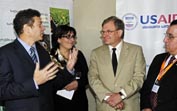
IDPs in Shida Kartli receive modern irrigation systems
By Messenger Staff
Monday, September 30
On September 25, 2013, U.S. Ambassador to Georgia, Richard Norland, Ambassador of Israel to Georgia, Yuval Fuchs, and Minister of Internally Displaced Persons from the Occupied Territories, Accommodation and Refugees of Georgia, David Darakhvelidze, delivered modern irrigation systems and vegetable seedlings to IDPs from the Khurvaleti, Berbuki and Shavshvebi IDP settlements in Shida Kartli.
This project is a collaboration between the U.S. Agency for International Development’s (USAID) New Economic Opportunities (NEO) Initiative, the Embassy of Israel in Georgia, Israel’s Agency for International Development Cooperation (MASHAV), an Israeli producer of drip irrigation systems Netafim, and the Georgian food distribution company Eco Farm.
The joint initiative addresses many constraints IDP farmers face in the settlements of Khurvaleti, Berbuki and Shavshvebi, including the provision of vegetable seedlings and modern drip irrigation technology, training and technical assistance in modern techniques of vegetable production, and linkages to a secure buyer for the distribution and sale of the harvested vegetables.
Minister Darakhvelidze said it is important that all this happens along the administrative border and it is clearly seen that from our side of this artificial border, the life precedes its development, mainly development of the agriculture and generation of livelihood for IDPs. And, from another side, there is a situation which is inadaptable for Georgian society and the whole international community.
“I hope that construction of these artificial borders will be interrupted very soon and Georgian, Ossetian and the Abkhazian people with other nationalities will live peacefully,” he said, referring to the de facto border at the Russian occupied Tskhinvali region.
The US Ambassador said the US is glad that it implemented the project in cooperation with Israel. He said this project aims to fulfill three very important goals of the Georgian government. It aims to revitalize the rural economy, to galvanize the agricultural sector and to assist internally displaced people with housing and jobs.
“The United States is delighted to partner with Israel and with the Georgian government to come up with this very creative drip irrigation technology, which will help grow different kinds of crops here and in other parts of Georgia. As the Israeli Ambassador said, and I strongly associate myself with his phrase, that we should be growing lettuce and not fences,” the US Ambassador said.
By gaining access to the latest equipment and technology in vegetable production, IDP farmers will have the opportunity to improve their livelihoods by generating income from the sale of harvested vegetables.
“This will help to settle issues of IDPs living in Georgia. I hope that their economic state will be improved and they will have the possibility to have their own farm some kilometers from the administrative border,” stated the Ambassador of Israel.
Over the past two years, the NEO has implemented numerous agricultural value chain development initiatives in close cooperation with various donors and partners to promote rural economic development in different regions of Georgia. MASHAV has been a key partner for USAID/NEO, by providing support in promoting the best international practices and use of modern technologies in the fruit, vegetable, beekeeping, and livestock value chains in four regions of Georgia.

